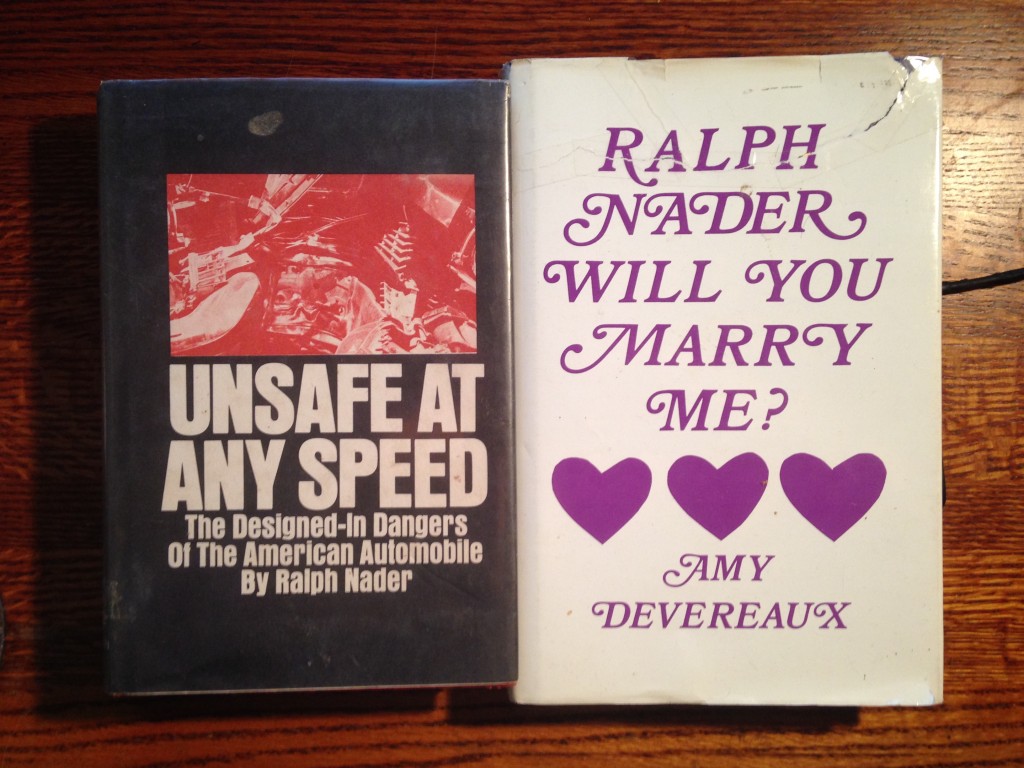Literary Oddities: Ralph Nader, Will You Marry Me?
The first thing you notice about the book Ralph Nader, Will You Marry Me? is that its title is Ralph Nader, Will You Marry Me? If that is not enough of a stimulus to pick up a book, I don’t know what is.
Um, okay…
“The author has succeeded in placing herself in a totally vulnerable position where she is completely exposed. Actually at the end she surrenders because she is sick and tired of this war which has taken so much of her time and energy with no tangible results. Now that she is defeated, Amy Devereaux is wondering if Ralph Nader takes prisoners of war or if he shoots them on the spot. In either event, she says she will be happy to finally be at peace with herself and that will be her greatest victory.”
You assume at first that Ms. Devereaux’s wartime metaphor sprung from her writing this book during the Vietnam conflict, but no, it was published in 1988, long past Vietnam, and long past Nader’s glory days as a passionate consumer advocate for that matter.
The incoherence presents a different problem. You’re not sure exactly what the jacket blurb is getting at with this paragraph, except that the author of Ralph Nader, Will You Marry Me? is a bundle of raw nerves, ready to die if that what it takes, to — to — to what, exactly?
“This true story is about how foolish one can act when one is captivated by romantic love. Amy Devereaux is not a fictitious character and neither is Ralph Nader, but this story is really about her. Ralph Nader Will You Marry Me? follows the path that the author’s imagination takes writing letters, songs, poems, and a musical play to her hero. The actual contact that she makes with the real man misses her mark. Afraid to find out what he is really like, she avoids the opportunities she is given to confront him in person.”
Um, so, okay. The grammar is a little off but the message seems clear enough. Ms. Devereaux, it seems, is genuinely in love with, um, with Ralph Nader, and has actually written a book about her love for him. A 165-page-long book. One that includes the aforementioned letters, songs, poems, and, yes, a musical play, which the Table of Contents tells us is entitled Passionate Purple to Ralph Nader, a musical play.
“Confessing her failing, the author hopes to become free of it. In a way the story does not have an end because Ralph Nader and Amy Devereaux do not meet again inside the pages of this book. Will they ever meet? Will Amy and Ralph marry someone else? The answers to these questions remain unknown. Perhaps they will be answered in a prologue to the next edition of her next book.”
Yes, perhaps they will.
In the meantime, you’re still scratching your head. The prose of the jacket flap is not encouraging, but it’s still not entirely clear whether Ms. Devereaux means this book to be tongue-in-cheek, or, or — well, the alternative is that she’s written a book-length marriage proposal to Ralph Nader, and that’s just too weird to contemplate.
Luckily, this copy comes with a press release tucked inside the front cover, from the desk of one Mary Ann Belyea, Ms. Devereaux’s public-relations representative. The press release is four pages long and describes Devereaux’s many attempts to gain Nader’s attention. “During her 12-year romantic pursuit of her dream hero, Devereaux has directed hundreds of letters, gifts, packages and poems to Nader’s Washington office…None of her letters have been returned; none have been answered.”
It goes on: “Nader’s obvious disregard for her pleas for attention have not deterred Devereaux from her pursuit. Nor did it stop her from visiting his office, confronting him in the hallway to sing a solar energy song she had written, and later intruding on a conference to hand him birthday gifts. Even after his angry dismissal that day, Devereaux continued to bombard the consumer advocate with her pleas, devising elaborate schemes to make contact with him, even composing a ‘contract’ for his signature, promising that if they met she would never divulge their conversation. The contract went unanswered, too.”
You can’t imagine what Nader was thinking. A woman accosts him in the hall, sings him an unsolicited song on the subject of solar energy, interrupts a conference to bring him birthday gifts and sends him a contract for a personal conversation — what’s not to like?
The press release — my God, you exclaim, this is a press release! That means she wants people to know these things! — continues to discuss how Devereaux’s obsession with Nader has “caused her to reject other men with whom she might have had meaningful relationships,” and adds, “[Devereaux] sometimes fantasizes that the book…’will get Ralph’s attention, we’ll meet and he will marry me.'”
Well naturally — if you want a man to marry you, what would persuade him to do so better than a book-length marriage proposal?
We also learn that Ms. Devereaux is “a graduate of Arica Institute, est, Insight Transformational Trainings, Silva Mind Control, Adventures in Attitudes, and Peace Theological Seminary classes…and is a minister in the Movement of Spiritual Inner Awareness.” You know, you say, if you ask me, the only thing more convincing than graduating from a crackpot self-help program is graduating from six.
What is wrong with this Nader guy? How could he let a catch like this get away? The press release concludes with an itinerary for Ms. Devereaux’s five-city book tour.
And all of that is before you even open the book.
The introduction begins “I wrote this book attempting to convince Ralph Nader that my love for him is sincere and that I have the ability to fulfill my promises. It will be impossible for Ralph to deny my reality and for me to continue my fantasy once we face the truth together, whatever that is.”
Well, exactly.
“Once RALPH NADER WILL YOU MARRY ME? is in print and widely publicized, I can no longer rationalize Ralph’s silence by telling myself that he has been sheltered from knowing about my existence and my letters by his staff. I do not want to spend the rest of my life in a dream world, like Cervante’s [sic] Don Quixote tilting at windmills. I want to be loved on earth as well as in heaven.”
Well, that answers your question — she is sincere, she loves Ralph Nader, and she’s written a book to get his attention. Singing to him in the hallway didn’t do it, delivering a birthday present to him during a conference didn’t do it, deluging his office with hundreds of letters, gifts, packages and poems didn’t do it, well, god damn it, this book will do it. It has to.
The book proper consists of letters, poems, song lyrics, personal reminisces, a little autobiography, and yes, a musical play. The play begins with a character named AMY entering the offices of a character named RALPH, who is apparently some kind of important consumer advocate. Ralph is reluctant to meet Amy at first, and indeed shows signs of fear and desperation when he hears she has entered his offices. Eventually he realizes what a unique, impressive person she is, and views on solar energy are discussed. There are many love duets.
Sample lyric:
AMY: YES, I REALLY LOVE YOU, RALPH, AS I LOVE MYSELF.
RALPH: WILL YOU HELP ME WITH MY WORK AS WELL AS IRON MY SHIRTS?
AMY: I WILL WORK AS HARD AS YOU, BUT IRONING MAKES ME BLUE.
RALPH: WHAT WILL YOU DO AS MY WIFE, WHEN YOU SHARE MY LIFE?
AMY: I WILL COOK AND CLEAN OUR HOUSE, JUST DON’T BE A LOUSE.
Sample dialogue:
RALPH. Amy. I’m so grateful that I didn’t write you off as crazy. You are crazy. You know that, but blissfully so. Your craziness did save me, as you intended it to.
AMY. I did want to save you, but I didn’t know what from.
RALPH. From my false self, the part which is always so serious, the part which bores people. Would you like to dance?
AMY. Yes, I would.
Sample stage direction:
(Ralph lifts Amy into his arms and carries her into his bedroom where he lays her gently on his bed. Ralph lights a candle by the bed and turns out the rest of the lights.)
The play ends, as all romantic comedies must, with a wedding. No points for guessing who gets married.
The book also includes a short story, “Maria’s Farewell,” which does not seem to be directly related to the author’s pursuit of Ralph Nader, and is apparently inserted here to show that Ms. Devereaux is capable of writing something other than book-length marriage proposals to Ralph Nader.
It ends with this personal message to Nader: “Taking the personal, emotional, and financial risks I have by exposing myself to the public and to you, unprotected as I am, is the final demonstration of my love for you, short of personal contact which depends on your cooperation. I can do no more. It is up to you. Will you accept my love or reject it? That is the question, just like Shakespeare’s ‘To be or not to be.’ Will you be with me? Ralph Nader, will you marry me?”
From the Introduction: “I wanted Ralph’s fans to know that he is loved by an intelligent, sensitive, loving, attractive, single woman. The fact that he has remained unmarried up until now is not the result of his being unloved or unlovable.” Tell that to the Democrats of 2000.
Google does not divulge the existence of Initiation Publications, nor that of Mary Ann Belyea Public Relations. However, apparently Ms. Devereaux is still very much around, creating art, which I am pleased to report is not bad at all, and can be viewed here.
Literary Oddities: You Can Survive the Bomb
Pulled this out of a long-forgotten box of books earlier. No, it’s not a self-help book written by Ben Affleck, it’s a classic 1961 slab of grim cold-war profiteering by one Col. Mel Mawrence.
The front cover blurb reads, in its entirety, “This book is a myth-shattering guide to bomb survival which offers new hope for millions of Americans. It firmly contradicts the ‘certain death’ psychology of well-meaning but mistaken spreaders of despair and…”
Despair and what? For god’s sake man, don’t leave us hanging! Luckily, the blurb continues on the back cover:
Read more
Literary Oddities: Tumbleweed Trouble
As a Hollywood screenwriter, I am exposed to bad storytelling on a daily basis. One tributary of the river of bad storytelling is misguided adaptations of pop-culture icons. “What if Superman were a gypsy farmer?” “What if Mickey Mouse was a molecular physicist?” “What if you re-imagined the Green Lantern Corps as the team from Reservoir Dogs?” (Hey, that one’s not bad — hang on, I need to make a phone call.)
In the sweepstakes of inept pop-culture adaptations, I have, I believe, a winner. This is, I believe, as bad as it gets. This is not fanfic, this is not slash Smurfs, this is not Santa Claus Conquers the Martians. This is The Road Runner: Tumbleweed Trouble by Jack Woolgar (although apparently not this Jack Woolgar.) This is a real book, sanctioned (but apparently not read) by the creators (or at least the owners) of the Road Runner (that is, Warner Bros Inc.) and associated characters, published by a real publisher, Whitman Books (a complete list of other Whitman “Tell-A-Tale” books can be found here).
What makes this book so bad? How does it rise above (or, rather, sink below) the ranks of all other bad pop-culture crap?
Let’s take a look inside, shall we?
brace yourself




